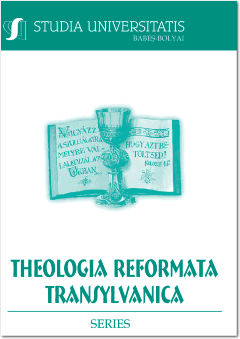A MEGBÉKÉLÉS JÓZSEFI PARADIGMÁJA
THE PARADIGM OF RECONCILIATION SEEN AT JOSEPH
Author(s): Sarolta PüsökSubject(s): History of Church(es), Biblical studies, Systematic Theology, Pastoral Theology
Published by: Studia Universitatis Babes-Bolyai
Keywords: envy; hatred; faith in providence; reconciliation; Joseph; Miroslav Volf; Thomas Mann;
Summary/Abstract: The Paradigm of Reconciliation Seen at Joseph. The origin of unrest. The first part of the present study examines the origin of violence. In the biblical vision of the Paradise the lion does not harm anyone and the power and justice do not extin-guish peace.However, the earthly interpretation of justice, that of the mankind is mistaken, thus control and power have become a constant source of conflict. The greed for power over others destroys peace. The study presents the train of thought on vio-lence and peace from the book Exclusion and Embrace written by Miroslav Volf. The presented work writes openly about the distortions of the human interpreta-tion of justice. In Volf’s book Christ’s Kingdom of peace that has to come is deemed true but the author raises the question that until the promises will be fulfilled what does remain for His followers to do. Volf also asks whether the earthly life of the people is related to Christ and if yes, how does this bond manifest itself.Humanity has already come up different ideas to overcome violence, the mod-ernists put their hope into the intellect, others thought that the universal peace be-tween religions would put everything right, but the dreadful events of the 20th century showed wrong all the ideologically implemented attempts to establish peace. The only possible solution that remains is imitatio Christi.Reliance on God and its power to make peace. The second part of the study high-lights one of the Old Testament paradigms of the pious believer’s conduct on the subject of violence and reconciliation.The biblical stories carry timeless messages, behavioral patterns, archetypes which are worth analyzing so that evil cannot be repeated, to stop transmitting bad schemes and empower the functional ones through biblical examples.Joseph’s story unfolds from an ancient experience, from the fact that if someone is chosen it will result in the peers’ envy and hatred. The continuation of the story is conventional, in the sense that there are almost lawful manifestations of human evil, the brothers endanger Joseph and remove him by force. The really exciting part un-folds in the end, when Joseph acts atypically, breaking the chain of violence, re-sponding with forgiveness instead of revenge.He explains: You intended to harm me, but God intended it for good (Genesis 50:20). He understood that everything is part of God's providence, including what was painful, what he did not agree with, or what he did not understand at all. Jo-seph’s first great realization is that the absolute forgiveness belongs to God alone, who is the one who sees through the events of the world, and finally Joseph realizes that only those can have a future who do not cling to the grievances of the past but is open and ready for new duties.
Journal: Studia Universitatis Babeș - Bolyai Theologia Reformata Transylvanica
- Issue Year: 65/2020
- Issue No: 1
- Page Range: 144-157
- Page Count: 14
- Language: Hungarian

